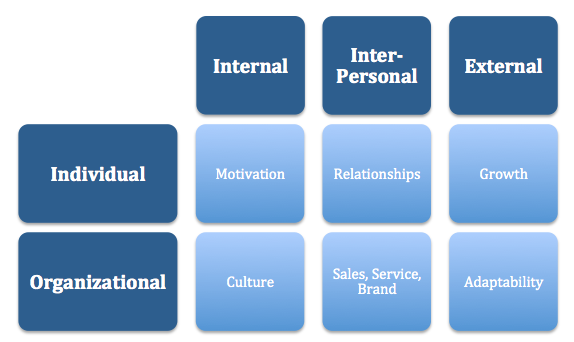The Respond Matrix: The Critical Importance of Responding Well
 You may have heard of the phrase, “It’s not what happens to you, it’s how you respond to it.” I agree with that statement, but you may not realize just how true and powerful that is.
You may have heard of the phrase, “It’s not what happens to you, it’s how you respond to it.” I agree with that statement, but you may not realize just how true and powerful that is.
How you respond affects every area of your life: personally, professionally, and even organizationally.
You can plan all you want, but it’s how you respond that matters.
Anyone can do well when everything goes according to plan. It’s the people who respond effectively when they don’t who are the ones who get ahead. When you create a plan, you have two options:
- Be prepared to respond effectively when things don’t go as expected.
- Cross your fingers and hope that everything goes according to plan.
When looking at the impact of responses, there are three types of responses: internal, interpersonal, and external. These responses can be applied in two areas: individual and organizational, creating The Respond Matrix:
Individual-Internal
Your individual-internal response is about what’s going on in your head. This is basically your self-talk, and it has a huge impact on your motivation, personality, and productivity.
When that self-doubt creeps up, how do you respond internally?
We’ve all been in that situation where we’re thinking about doing something like applying for a job, bringing an idea to our boss, having a rough conversation with a loved one, etc. Then the self-talk pops up; the little voice that says, “No you can’t do that.” How do you respond in that moment?
Respond positively, with an open-mind and a focus on solutions and you will be motivated and productive.
Respond negatively and you’ll hold yourself back and get frustrated and want to give up.
Individual-Interpersonal
The individual-interpersonal response is how you interact with other people. This response defines your relationships.
It’s easy to get along with people with whom you communicate well. The real question is, “What kind of relationship do you have with someone when they come at you with something unexpected, something different than you would’ve done, something that maybe feels challenging or wrong to you?”
How you respond in the moment defines that relationship.
In your personal life if you are struggling with someone whose relationship is important to you like a family member or good friend you’ve had a falling out with, look at how you respond when they do something you don’t like.
It’s easy to blame the other person, but take a step back and look at your own response. It can have a dramatic impact on the relationship.
Similarly, professionally, how do you respond to coworkers, to your bosses and supervisors, to people who work for you? Again, anyone can work well with people who are on the same page. Pay attention to how you respond to those who are different. That can make a huge difference in your success and career growth.
Individual-External
The individual-external response is about how you respond to things that happen around you, When you’re faced adversity, things don’t go your way, or a big change happens in your life, how do you respond?
Some people put their head in the sand and hope it goes away. Some complain and whine. Some try to pass the buck (and blame).
Others dig deep and respond by taking action and look for opportunity in the adversity. How you respond to these external things really determines whether you will achieve your goals, how you develop a person, and what kind growth you have.
Organizational-Internal
Organizational-internal responses are about culture. How do the people in your organization respond internally to each other?
The answer determines whether you have a strong team or one that is constantly in-fighting. An organization can be torn apart simply because people are not responding to each other positively, with a focus on supporting each other.
Organizational-Interpersonal
Interpersonal responses in an organization are about the relationship between your organization and the outside world. This comes in the form of sales, customer service, public relations, and branding.
This response has a huge impact. How do you respond when someone outside the organization responds in an unexpected way?
In a sales call, if the prospect changes their attitude at the last minute, how do you respond? Do you angry, stressed, or give up? Or do you come back with more questions, with better information, and see what alternative you can provide?
With customer service, how do you respond to a customer with a complaint? Are you positive? Do you solve the problem, or do you just pass the buck, or tell them, “Sorry I can’t help you”?
When it comes to your brand, the fact is that your reputation will be based less on PR efforts and more on how you respond to people in times of trouble and stress.
Organizational-External
Organizational-external responses are about how you respond to changes and events in the outside world.
When the industry changes, when laws and policies shift, when new competition arises, how your organization responds in these moments defines whether your organization will survive (or potentially get ahead), or whether it will collapse and fall behind.
Organizations that don’t respond to external changes can and do go under. For example, Kodak refused to respond to the fact that the world was moving to digital photography. They responded to this external change by putting their head in the sand and assuming they didn’t need to do anything. They are now out of business.
How About You?
Here’s homework for you. For each of the six categories, consider:
- Where do you excel?
- Where could you, or your organization, use a little improvement?
Instead of worrying about cracking the next great plan to achieve what you want, analyze and adjust how respond in various scenarios. That is what will make all the difference.
***
Want Help Improving Your and/or Your Organization’s Response?
If so, contact Avish now and talk about how he can help you individually or your organization as a whole!













 RSS
RSS Email
Email




